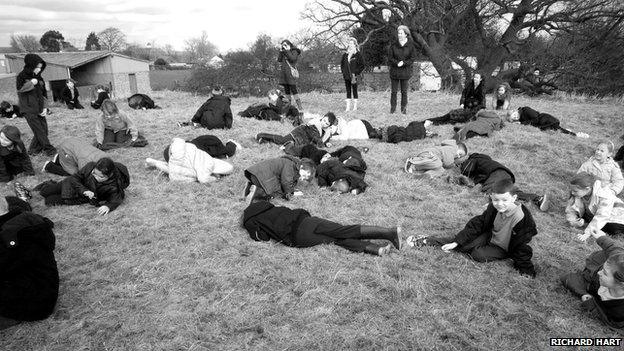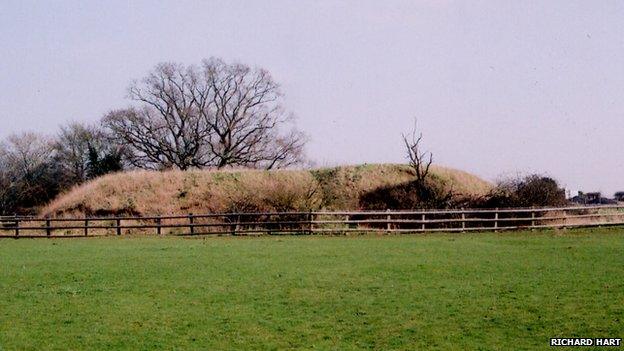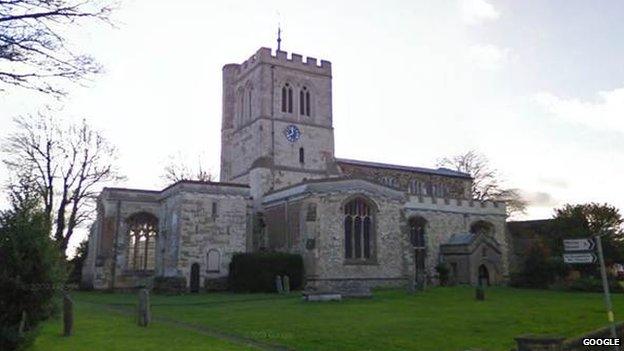Shrove Tuesday: Toddington's 'pancake-making witch hunted'
- Published

Toddington children listen for the witch in 2012 - the first time since the 1970s
When the Toddington parish church bell rings just before midday, about 60 school children will leave their classes and run up Conger Hill. But this is no traditional pancake race.
What makes two classes emerge from lessons at the St George Church of England School into the muddy fields of Bedfordshire is the pursuit of evidence of a legend.
After running up the hill, the children will press their ears to the ground and listen for the sizzling sound of a witch frying her pancakes underneath.
But like so many historical tales, the origins of the tradition are debateable, although it appears to be at least 150 years old.
"Nobody knows how the legend arose - I guess it only takes one kid to say they heard something on the hill and word gets round and the legend carries on," says farmer David Buckingham, who has written a book on the history of Toddington and on whose land sits Conger Hill.
'Pancake bell'
Set within what is now Griffin Farm, the site featured a Norman motte and bailey castle thought to have been built during the 12th Century.
Historical reports show that every Shrove Tuesday, at the St. George of England Parish Church, the "pancake bell" was rung to remind the women of the village to make their pancakes, and the prompt for the children to run up the hill.
Mr Buckingham, who has lived in the village for more than 70 years, said the first record of the event he could find was in the village school log of 1865.
"The headmaster gave the children a half-day holiday to go out on the hill but whether he just wanted to get rid of them for the afternoon I don't know," he said.
The log says "Being Shrove Tuesday, according to ancient custom, the children have a half holiday", suggesting it was already well-established.
He said the custom seemed to die out after that but in 1950, headmaster Richard Dillingham picked up on the legend and revived the tradition which continued until the 70s when the children were often filmed by intrigued television reporters.

Conger Hill was the site of a Norman motte and bailey castle, probably built during the 12th Century
The practice died out "probably because the children came home in a mess and the teachers were getting stick from parents," said Mr Buckingham.
'Happy memories'
But recently, the Toddington Old Boys' Association (TOBA) decided it should be rekindled and in 2011 some of them went to check the witch was still frying.
"I am pleased to say she was," said TOBA member John Bryant, a former pupil at the school who took part in the "listening" in the late 1950s.
"We all had very happy memories of doing this when we were kids, we thought it was a tradition worth keeping and something the next generation should know about."
In 2012, they were able to revive the tradition and now school staff have incorporated the story into the children's learning.
Teacher Beverley Kemp said: "It is a way of them understanding myths and legends and how everywhere, including Toddington, has them.
"We have talked about how this was a local event and how much may be true or not true - then it's up to the children to make up their own minds."

The "pancake bell" rang at Toddington's St George of England church to remind women to make pancakes
However, has the witch actually been heard?
Mr Buckingham is adamant "there isn't a sound".
"As a kid I probably thought I heard it, but I didn't," he said.
But Mr Bryant strongly disagrees.
"Of course I have heard it," he said.
"If somebody suggests to me all we were hearing was the vibration of the church bells I say, 'How dare you - of course there is a witch under the hill'."
The suggestion the noise comes from the bells or the clock may not be far from the truth as it is likely their reverberation was the start of the legend.
Paul Sieveking, former editor of the Fortean Times that looks at the world's strange phenomena, said: "The dynamic of folklore is to invent stories to explain what people see or hear - it makes a good tale."
- Published21 February 2012
- Published8 March 2011